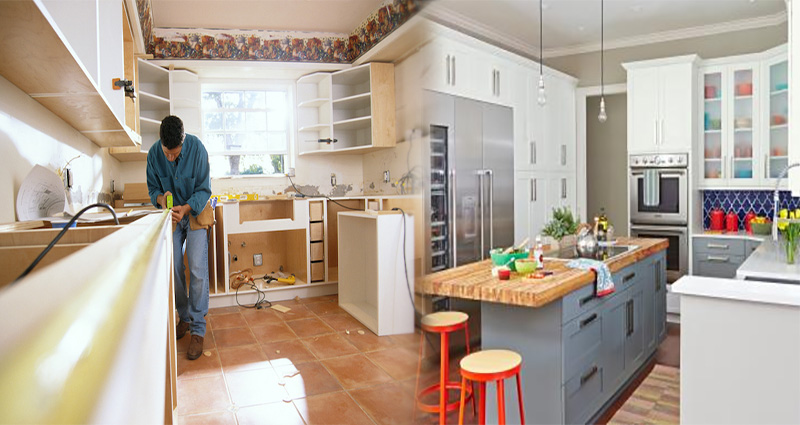I’ve always loved cooking, but I used to dread my kitchen. The cabinets were outdated and mismatched, the countertops were dull, the floor looked like it belonged in a basement and there was no way anyone would ever want to eat what I made in that room. So finally I decided it was time for a serious renovation. But before you dive into your own project—whether you’re upgrading one room or an entire home—here are some of the lessons I learned along the way:
Plan for the worst.
When planning your kitchen renovation, it’s important to think about the worst-case scenario. You have a contract with your contractor, but what if they don’t live up to their end of the deal? What if they go out of business or get hit by a bus before the project is done? What if you find out that your beautiful marble countertops are actually made from asbestos and will kill anyone who comes into contact with them?
You should always plan for these kinds of things–that way, when something does go wrong (and it will), you’ll be prepared for whatever comes next!
Check out a few stores.
- Check out a few stores. When comparing prices and materials, it’s important to note that the same product can be listed at different prices from one store to another. Make sure you’re comparing apples with apples by checking out both the price and quality of materials at each place you visit–and don’t forget to ask if they have any coupons!
- Get advice from the experts. Don’t just look at pictures online; go into your local hardware stores and talk with employees who work there about what might work best for your kitchen renovation project (and hopefully get some free samples). Before making any decisions on design ideas or styles, ask friends who have recently renovated their kitchens what they like most about their new spaces–this will help give insight into what works best when renovating a space like yours!
Don’t get too attached to one style or material.
As you may have read in a previous post, I wanted to have a kitchen in my home that felt like it was made for me. My goal was to create something that would reflect my personality and style and bring some warmth into our house. But as with any design project, there were plenty of ups and downs along the way–and many lessons learned along the way too!
One big lesson I learned was not being too attached to one style or material because sometimes things don’t work out exactly how you had pictured them in your head (or budget). For example: I initially wanted wood cabinets but my husband convinced me that stainless steel would look better; however after living with them for over two years now he is starting ask why we didn’t just stick with his original suggestion…
Start with small projects.
If you’re not sure where to start, pick a small project that doesn’t require a lot of expensive materials. You could install a new faucet or replace the countertop, for example. These are projects that can be done by most homeowners (with some help from friends or family) and will give you some practice before tackling something bigger like installing new cabinets or flooring. Don’t get discouraged if things don’t go exactly as planned; just keep trying until they do!
Think about long-term use and maintenance when choosing materials.
As you consider the materials for your kitchen renovation, think about how you’ll use it. What kind of cooking do you do? Do you host parties often or just cook for yourself? Do you need extra storage for pots and pans, or is there already plenty of space in other areas of the house (like a pantry). Think about what kind of cleaning products will be used on a regular basis–and whether those products are safe for wood surfaces (or other materials). Finally, consider how much maintenance can be done by professionals versus DIYers like yourself. If there’s going to be an ongoing expense associated with keeping up with routine upkeep tasks like deep cleaning or polishing wood cabinets every few months (or even annually), then perhaps choosing another material would save money in the long run!
Take time to properly prep your walls, ceiling and floors before getting to work on your cabinets and countertops.
Preparing your walls, ceiling and floors before you get to work on your cabinets and countertops will save you time in the long run. The first step is to remove any old paint or wallpaper with a paint scraper. Next use a wire brush to prepare the surface for painting so that it’s smooth and free of debris. Finally, clean up any dust or debris with a damp sponge
Making sure your kitchen renovation is a success takes planning, patience and flexibility.
Whether you’re building a new kitchen or renovating an existing one, there are some key things to keep in mind as you get started. Here are my top tips for making sure that your renovation goes smoothly:
- Plan for the worst-case scenario. Before starting any project, take a look at what might go wrong and plan accordingly so everything runs smoothly. For example, if one option is going to cost more than expected but another option will save money in the long run, choose wisely! Also remember that unexpected things can happen during renovations–so be prepared!
- . Check out different stores before deciding on materials and styles (like lighting). Don’t get too attached right away; keep an open mind until after looking around elsewhere first since it may turn out something better exists elsewhere at half price! This way when someone asks “where did you find those?” there’s no need to lie because they’ll probably never know anyway 😉
- . Start small projects first such as replacing old appliances before doing anything else like installing countertops since these last longer than cabinets which can always be replaced later if needed – especially if we’re talking about woodworking here 🙂
Even if your kitchen renovation doesn’t go perfectly, you can still end up with a beautiful space that works for you. The key is to make sure that you plan well and are flexible enough to adapt when things don’t go as expected. If possible, try taking small steps before tackling a big project like this one–that way if something goes wrong or takes longer than expected (which it likely will), it won’t ruin everything else!











